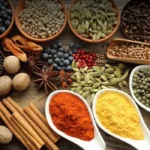Key Takeaways:
✔ Natural Disease Fighters: Many herbs and spices contain antioxidants and anti-inflammatory compounds that may lower cancer, diabetes, and heart disease risks.
✔ Blood Sugar & Heart Health: Cinnamon, garlic, and cardamom show promise in regulating blood sugar and improving cardiovascular function.
✔ Digestion & Immunity Boosters: Ginger, peppermint, and oregano support gut health, reduce inflammation, and may enhance immune response.
14 Herbs & Spices That May Prevent Cancer, Diabetes & Heart Disease
For centuries, herbs and spices have been cherished not just for their flavors but also for their medicinal properties. Modern science now confirms what traditional healers have long known—these everyday ingredients can play a crucial role in preventing chronic diseases like cancer, diabetes, and heart conditions.
Packed with antioxidants, anti-inflammatory agents, and bioactive compounds, herbs and spices offer a natural way to enhance health without relying on processed additives. From stabilizing blood sugar to boosting immunity, here are 14 of the most beneficial herbs and spices you should be eating regularly.
1. Black Peppercorns: The Anti-Cancer Spice
Black pepper isn’t just a table staple—it contains piperine, a compound that may help destroy damaged cells before they turn cancerous. Early lab studies suggest it could be particularly effective against breast, prostate, and lung cancers. While more human trials are needed, adding a pinch of black pepper to meals could offer protective benefits.
2. Cardamom: A Heart-Healthy Powerhouse
Common in Indian and Middle Eastern cuisine, cardamom is rich in antioxidants that support heart health. Research indicates it may help lower blood pressure in people with hypertension, along with aiding digestion and blood sugar regulation.
3. Cayenne Pepper: Metabolism Booster
The heat in cayenne pepper comes from capsaicin, a compound that activates fat metabolism and may reduce heart disease risk. Studies even suggest that regular spicy food consumption is linked to a longer lifespan—though those with acid reflux should use it cautiously.
4. Cinnamon: Nature’s Sweet Regulator
This warm spice does more than enhance flavor—it lowers fasting blood sugar and improves insulin sensitivity in type 2 diabetics. Additionally, daily cinnamon intake may help relax blood vessels, promoting better circulation and reduced blood pressure.
5. Cloves: Antioxidant-Rich Pain Relievers
Cloves contain eugenol, a potent antioxidant that fights oxidative stress and inflammation. Traditionally used for pain relief, modern studies support their role in easing joint discomfort and improving overall immunity.
6. Coriander: Brain-Protecting Spice
Often found in curries, coriander seeds contain compounds like linalool, which may protect against neurodegenerative diseases like Alzheimer’s. While more research is needed, early findings are promising.
7. Garlic: The Natural Blood Pressure Regulator
Garlic’s sulfur compounds help lower high blood pressure, with some studies showing effects comparable to medication. It also bolsters immune function, offering mild protection against infections like the flu.
8. Ginger: The Ultimate Anti-Inflammatory
Known for easing nausea and digestive issues, ginger also contains gingerols, which work similarly to ibuprofen in reducing pain. It’s particularly effective for migraines, menstrual cramps, and arthritis.
9. Oregano: Infection-Fighting Herb
Packed with carvacrol and thymol, oregano has strong antibacterial and antifungal properties. Emerging research suggests it may also have anti-cancer potential, though further studies are needed.
10. Paprika: Pain-Relieving Spice
Thanks to its capsaicin content, paprika helps reduce inflammation and may interfere with pain signals in the brain. It’s often used in topical pain relief treatments.
11. Peppermint: Digestive Soother
Peppermint tea or oil can relax digestive muscles, making it a go-to remedy for IBS. Its aroma also enhances focus and reduces nausea.
12. Rosemary: Memory & Mood Enhancer
This fragrant herb has been shown to boost alertness and concentration. Nurses in one study reported feeling more energized after exposure to rosemary oil during shifts.
13. Turmeric: The Golden Anti-Inflammatory
Curcumin, the active compound in turmeric, fights inflammation linked to arthritis and diabetes. Pairing it with black pepper enhances absorption, maximizing its benefits.
14. Za’atar: Gut & Liver Protector
This Middle Eastern blend (oregano, thyme, sesame, and sumac) is rich in polyphenols, which support gut health and may reduce liver inflammation.
Final Thoughts
Incorporating these herbs and spices into daily meals is an easy, delicious way to enhance health naturally. While more research is needed in some areas, their long-standing use in traditional medicine—backed by modern science—makes them a worthwhile addition to any diet.
Always consult a healthcare provider before making significant dietary changes, especially if you’re on medication.









































Leave a Reply